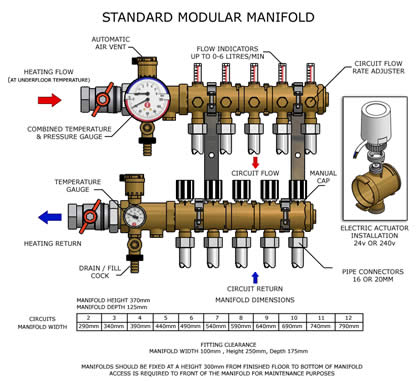Manifolds
A manifold consists of a single pipe initially which is then branched into several other pipes, each of which can carry different substances through. It regulates fluid flow between pumps, actuators, and other components of a liquid system. A manifold is similar to a switchboard in electrical circuits in letting the operator control how much fluid flows between components of a machinery.
Advanced behavior is allowed through different types of hydraulic valves. Hydraulic manifolds function nearly the same as automotive manifolds, which consist of an intake and an exhaust.
There also exists a slightly different type of manifold, called a block and bleed manifold, which combines a “block valve” (one that completely stops the flow of water) with a “bleed valve” (one that allows water to leak through, or “bleed”, slowly), to allow interface with other components such as switches. The block and bleed manifold isolates the flow of fluid in the system to prevent the upstream components from reaching the downstream components.
Block and bleed manifolds are also known as isolation manifolds.
http://www.valvemanifold.net/needle-valves.html#valve-manifolds
http://www.sprinklerwarehouse.com/Standard-Valve-Manifold-Kits-s/455.htm
http://www.amazon.com/Manifold-Irrigation-System-Weathermatic-Sprinkler/dp/B003KPDBEE
www.lawlervalve.com/content/61-25%20Manifold%20Recirc.pdf
www.rainbird.com/pdf/turf/ts_UVMS.pdf
It may also be ideal to create a manifold system of our own at this point, because we are using ~25 different ports to control different types of media, and the manifolds are rather expensive, so linking several 4-6-valve manifolds would not be ideal…
http://www.ehow.com/how_5864642_build-valves-valve-box-irrigation.html
